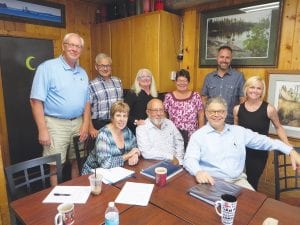Minnesota Senator Al Franken (D-Minn) was in Cook County Sunday, August 20, first meeting with the Grand Portage Tribal Council and with staff at the Grand Portage Monument, then later, meeting with local business leaders in Grand Marais.
A bemused Franken said it was his third visit to Grand Portage and after learning about the voyageurs’ eight-mile (grand) portage into the community, “A light went on in my head and I realized why they named the community Grand Portage,” he said to laughter.
Following a short tour of the grounds and learning about the role the park plays in the local economy, Franken headed for Grand Marais to visit with area business leaders at Java Moose.
Dennis Rysdahl, owner and manager of Bluefin Bay, told the senator that the process to hire foreign workers with H2B visas needed to be streamlined and made more affordable. Rsydahl said it cost $4,000 to pay the travel costs and legal fees for each of his 24 H2B workers this year.

A group of business-minded people met with U.S. Senator Al Franken at Java Moose last Sunday at about 4 p.m. In front, L-R: Kimber Wraalstad, Jim Boyd and Senator Al Franken. In back, L-R: Howard Hedstrom, Dennis Rysdahl, Jan Sivertson, Mary Somnis, Steve Surbaugh and Sarah Hallberg.
With the labor shortage in Cook County and many places around the state, the H2Bs also need to be made more available for businesses, and easier to extend, said Rysdahl. He mentioned this coming January there would be 100,000 applications for 33,000 available H2B workers and businesses unfamiliar with the process would be left without needed help.
How bad is the labor shortage?
H2B workers can stay one year, but holders of J1 visa work four months. Typically J1 visas holders are in college. When they return to school Rysdahl said he typically can’t hire enough help to fill the jobs. At that point managers pitch in to make beds, clean rooms, do what they can to keep the doors open. If enough help can’t be found, business has to be cut back, said Rysdahl.
When the senator asked about unemployment in Cook County, someone said it was two percent but Rysdahl responded, “It’s zero. Anyone who wants to work can work.”
With that, Rysdahl said he is investigating recruiting Burmese refugees to Cook County. There are currently 10,000 Karen people living in St. Paul, making the city the largest Karen community in the nation. Before any of that can happen Rysdahl told the senator the county would have to get involved and the school system would have to be notified so it could be ready to teach kids who may have difficulty speaking and reading English. Then there is the matter of finding affordable housing.
EDA Director Mary Somnis talked about the EDA’s efforts to build workforce housing in the county. Senator Franken said affordable housing was an issue across the whole state. “Trump’s administration is lousy on housing,” he added.
Sarah Hallberg, a member of the family who owns and runs Java Moose, told the senator her business had 16 peak weeks to make or break the year.
Java employees 26 employees between the ages of 14 and 64 (her dad) and pays them $15 per hour. She said they keep the employees working throughout the year even though they lose thousands of dollars in the off-seasons.
The senator said he was pushing to pass legislation that would help small businesses and he would like to get rid of the tax loopholes for corporations. Small business owners don’t have lobbyists, he said. They don’t have clout, but they pay an inordinate amount of taxes while corporations pay well below what they should be paying, he told Hallberg.
Another small business owner, Steve Surbaugh welcomed the senator and thanked him for supporting the Small Business Administration and the entrepreneurial fund. Low cost interest rate loans and help provided from nonprofit organizations that work with start-up business owners have helped to create sustainable jobs in the county, said Surbaugh.
North Shore Health administrator Kimber Wraalstad brought up the benefits the new telemedicine program would offer physicians and nurses at the hospital. She also asked the senator to see if new federal rules affecting the care center could be delayed for one year. “We don’t have the staff to carry them out,” she said. On the topic of the Affordable Care Act Wraalstad was explicit and firm, “I expect both sides to work to together to fix it!”
Howard Hedstrom of Hedstrom Lumber asked the senator to see if the Forest Service could be properly funded to fight wildfires. Currently, when there is a wildfire and the budget to fight them is used up, the Forest Service borrows from other departments. That leaves unfinished work done in areas like timber sales, which affect loggers and lumber mills.
Cook County Chamber of Commerce Director Jim Boyd pleaded “could you stop the insanity at the Environmental Protection Agency?”
Senator Franken responded, “Well the Trump administration is gutting the science and gutting the regulations that govern mining.”
“You hang in there, senator,” said Cook County Commissioner and board chair Jan Sivertson.
“Nope. I’m giving up,” said Franken to a roomful of laughter.



Loading Comments